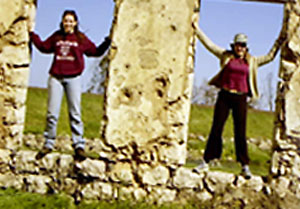Undergraduate (Bachelors Degree)
Undergraduate Degree in Israel Studies
Learning period: 3 Years | Type of Program: Single major, double major | Enrollment Status: Registration begins January 29, 2023 | Department web site
 The Department of Israel Studies is a multidisciplinary department that focuses on the Land of Israel and all aspects of the events that took place in it in different ages.
The Department of Israel Studies is a multidisciplinary department that focuses on the Land of Israel and all aspects of the events that took place in it in different ages.
The curriculum deals with the history of the nations and entities that operated in, inhabited, and still inhabit the Land of Israel and the State of Israel with respect to Israel’s physical geography, historical geography, socio-economic geography, sociology, anthropology, material culture and political science.
The Department of Israel Studies concentrates on all aspects of the special interest in the land itself, its inhabitants, landscape characteristics, history, and human uniqueness.
General Admission Requirements:
1. Complete Matriculation Certificate/ high school diploma or an equivalent recognized by the Israeli Ministry of Education or by the Registration Department.
2. Psychometric Entrance Examination/ SAT or ACT.
3. Knowledge of English– The level of English is determined within the framework of the Psychometric Entrance Examination, the English Placement Tests (AMIR /AMIRAM) or SAT, TOFEL, IELTS, ECRL tests.
The minimum level of English required for admission to the university is Basic (a score of at least 85). Certain departments require a higher level of English.
4. Knowledge of Hebrew – Applicants who took the Psychometric Entrance Examination in a language other than Hebrew and graduated from high schools where the language of instruction was not Hebrew, must prove satisfactory knowledge of Hebrew before the beginning of the academic year by passing a Hebrew Proficiency Test (YAEL/ YAELNET/ Hebrew classification test of the University of Haifa* ). The score required for admission to the University of Haifa is a score of at least 120 on the YAEL/ YAELNET/ Hebrew classification tests.
Applicants whose scores on the YAEL/ YAELNET/Hebrew classification tests range from 90-119 and their Psychometric score was at least 500 will be conditionally admitted and will have to pass the Hebrew Proficiency Test at the required score by the end of the first year of their studies. These students also have the option of studying a Hebrew literacy course within the framework of the University of Haifa preparatory program (Mechina) . Those who meet the course requirements and their final score in the course will be 85 and above will be exempt from the Hebrew condition.
Please note that certain departments require a higher level of Hebrew and that some departments do not approve admission with a Hebrew condition.
*The Hebrew classification test and Hebrew literacy course is valid at the University of Haifa only.
5.Departmental Entrance Examinations/Special admissions requirements– Certain departments require applicants to take a departmental Entrance Examinations and/or attend an interview or meet other departmental requirements.
For more information about the general admission requirements please read the supplement.
In addition to the general university admission requirements, the candidate must meet individual departmental admission requirements.
- A weighted score of 500 for the double major program
- A weighted score of 565 for the single major program
- Special admission requirements of the Faculty of Humanities.
- Outstanding graduates of the University of Haifa’s pre-academic preparatory program will be accepted (for more information click here).
- For the calculator that rates the likelihood of your admission, click here.
*The University reserves the right to change or amend the admission regulations, fees and tuition at any time without prior notification.
** Matriculation certificate = Israeli matriculation certificate or equivalent
- Single major
- Double major
- Tour guides program
Employment options upon graduation: Tourism, Keren Kayemet Le’Yisrael, the Antiquities Authority, teaching in schools and SHELACH programs (for certified teachers), museums, curatorships, and academic research.
